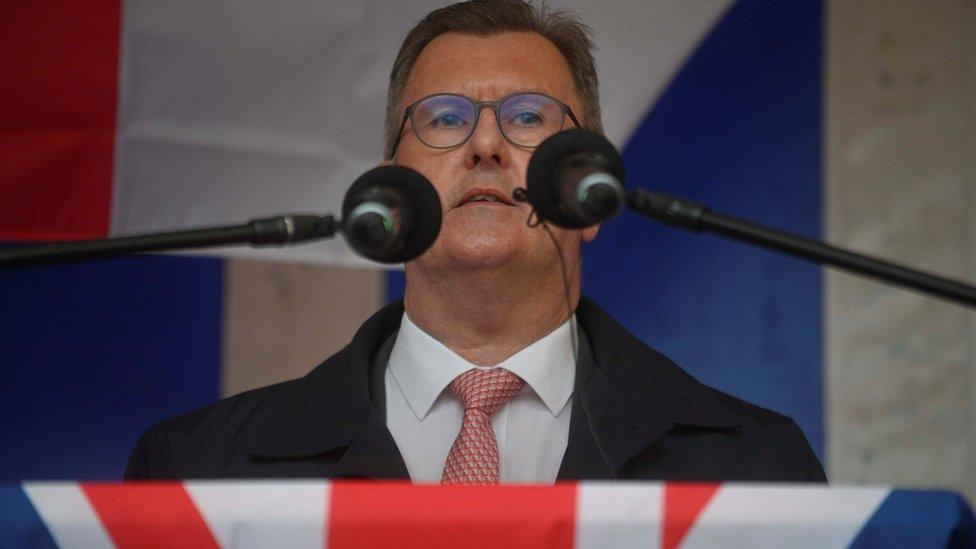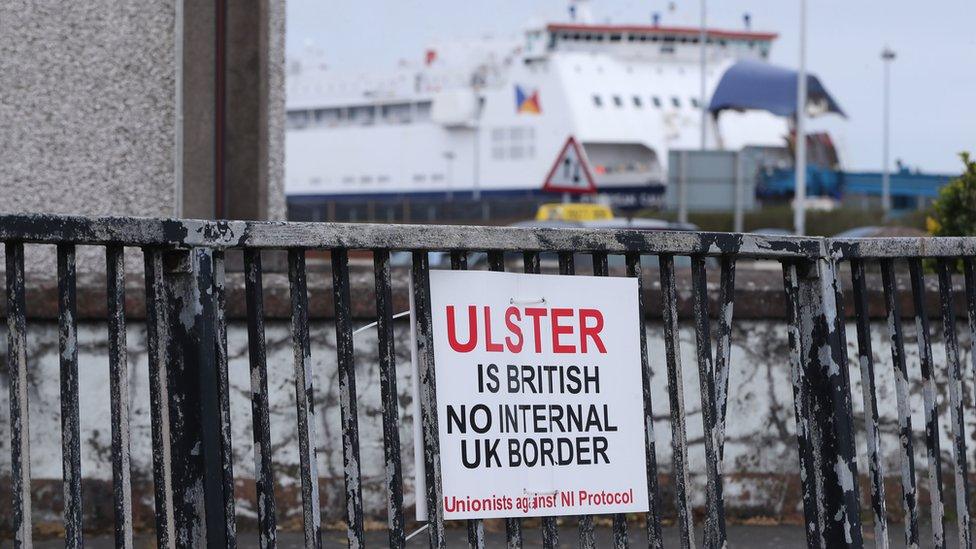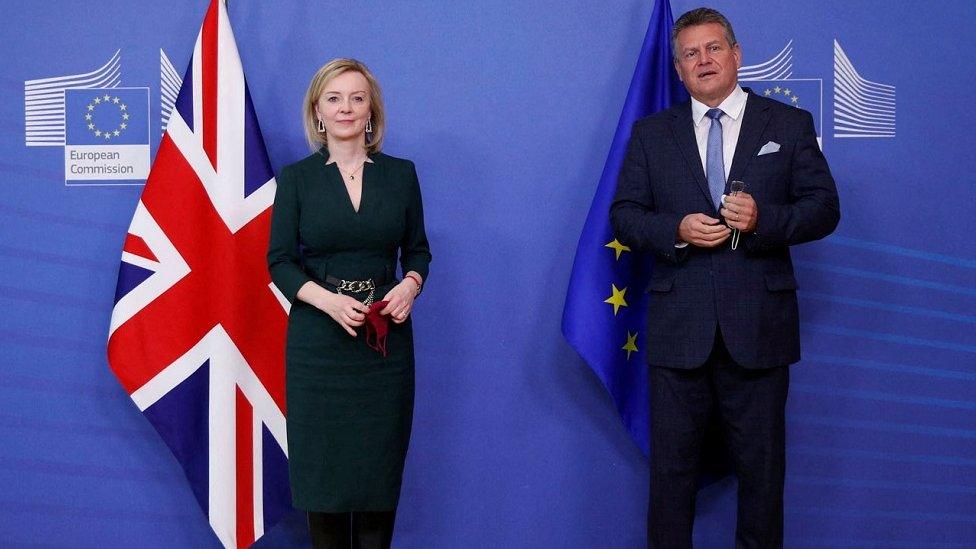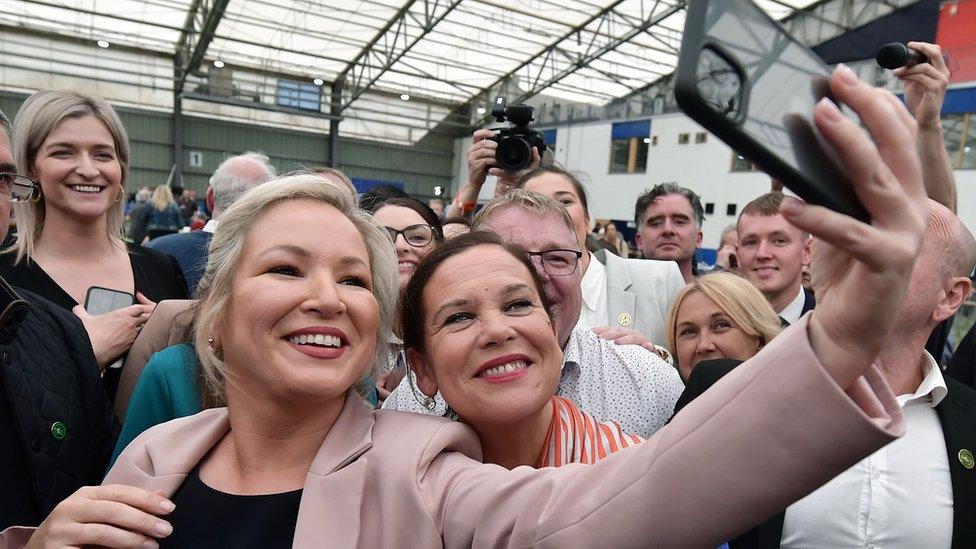Why is the DUP against the Northern Ireland Protocol?
- Published

DUP leader Jeffrey Donaldson at an anti-Northern Ireland Protocol rally in April
The Democratic Unionist Party (DUP) says it will not allow the formation of a new government in Northern Ireland unless there are significant changes to the region's Brexit deal, known as the protocol.
BBC NI looks at the issues.
Why do the DUP reject the Northern Ireland Protocol?
The protocol is a special Brexit deal for Northern Ireland designed to prevent the return of a hard land border with the Republic of Ireland.
It was agreed between the UK government and the EU in 2019, put into domestic law by the UK Parliament and came into force in January 2021.
It works by keeping Northern Ireland inside the EU's single market for goods.
This means Northern Ireland continues to follow some EU laws, and there are new checks and paperwork for certain goods which are imported into Northern Ireland from the rest of the UK.
The DUP says this trade border is damaging Northern Ireland's economy but its opposition is more fundamental to its unionist ideology.
Its election manifesto describes the protocol as "an existential threat" to the future of Northern Ireland's place within the UK.
It describes any economic impacts as the symptom of an underlying problem - that "Northern Ireland is subject to a different set of laws imposed upon us by a foreign entity without any say or vote by any elected representative of the people of Northern Ireland".
What does the party want?
Its manifesto lays out seven tests for any special Brexit arrangements, external for Northern Ireland.
They would amount to fundamental changes to the protocol.
These include no checks on goods going from Great Britain to Northern Ireland and giving the people of Northern Ireland "a say in the making of the laws that govern them".

The protocol is opposed by unionists, who argue it undermines Northern Ireland's place in the UK
They also believe the protocol undermines the principle enshrined in the Good Friday peace agreement that NI's constitutional status can only be changed with explicit democratic consent.
They say any arrangement should 'preserve the letter and spirit of Northern Ireland's constitutional guarantee.'
The party has participated in legal challenges claiming the protocol has unlawfully changed the constitutional status of Northern Ireland.
Those challenges have so far been unsuccessful but are yet to be considered by the UK Supreme Court.
How can the party get the changes it wants?
Ultimately it has to rely on the UK government.
The government can get changes in two ways.
Either it negotiates with the EU and agrees reforms or it acts unilaterally.
So far the UK's has pursued a combination of these two approaches.
What is happening in negotiations?
The EU accepts the protocol has caused difficulties for some businesses and that its operation can be improved.
The UK government is seeking more fundamental changes to the protocol which would be in line with DUP demands.

British Foreign Secretary Liz Truss and European Commissioner in charge of Brexit negotiations Maroš Šefčovič
Since October the UK and EU have been engaged in technical negotiations but there has been little tangible progress.
The EU has recently changed its laws to guarantee the supply of medicines from GB to Northern Ireland.
However that has barely been acknowledged by the UK, to the frustration of some on the EU side.
The UK's Europe minister recently described the talks as having "come to something of an impasse".
The UK would like the EU's chief negotiator, Maroš Šefčovič, to be given a more expansive mandate to agree changes to the protocol but there is little appetite for that among EU leaders.
The talks have been parked for the duration of the Northern Ireland election campaign but should start again soon.
And what about unilateral action?
The UK has taken, or threatened to take, unilateral action on several occasions.
Most memorably the government said it was prepared to change the implementation of the deal in a way which would break international law in a "specific and limited way".

Under the protocol, checks are required on goods coming into Northern Ireland from the rest of the UK
In recent weeks the government had hinted that it was prepared to introduce legislation which would give ministers the power to remove some parts of the protocol from UK domestic law.
For example that could mean ordering the ending of checks on some goods moving from Great Britain to Northern Ireland.
But for now the government appears have stepped back from such a move without ruling it out entirely.
Why can't Northern Ireland's other parties form a government?
Northern Ireland's other two largest parties, Sinn Féin and Alliance, have been sharply critical of the DUP.
They say the DUP's support for Brexit helped bring the protocol about and that boycotting the executive will not change it.
However the system of power-sharing in Northern Ireland, which flows from the Good Friday Agreement, essentially means that government cannot fully operate without the DUP taking up the deputy first minister post.
A caretaker administration can remain in place for six months but after that another election must be called.
That points to months of grinding negotiations between the EU and UK and between the Northern Ireland parties.
- Published8 May 2022

- Published2 February 2024
